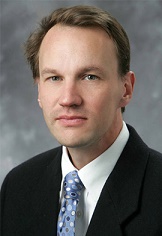
John Morgan
Professor of Economics of Organizations
During his nearly two decades at Haas, John Morgan left his mark on the school in many ways through his teaching, research, and leadership. He was the Oliver E. and Dolores W. Williamson Chair of the Economics of Organizations; co-director of the Fisher Information Technology Center; founding director of Xlab (the Experimental Social Sciences Laboratory); a member of the California Management Review editorial board; and faculty director for Berkeley Executive Education.
John was born on November 11, 1967 in Wilkes-Barre, Pennsylvania, a down-on-its-luck former coal-mining town. The town’s population had declined by around 50% since 1930. John would always refer to it as the "place that time forgot." John and his brother were raised by their single mom under difficult economic circumstances. He excelled at school and made his way to Cornell. After his first year, he transferred to the University of Pennsylvania’s Wharton School. Upon graduation, he joined a New York consulting firm, where he became a Certified Public Accountant and devised clever financial contracts for divorce agreements of CEOs. After a couple of years, he tired of this work and applied to graduate school in economics. Around this time, he also married Heather, his high school sweetheart. The top schools failed to spot his talent and he ended up at Penn State. With Vijay Krishna as his advisor, he became one of the stars of the economics job market of 1996. He accepted a tenure track position at Princeton, with joint appointments in the Woodrow Wilson School and the Economics Department. He left Princeton in 2002 and joined the faculty at Berkeley-Haas.
John Morgan embodied the highest values of faculty service at Haas. He was a gifted teacher, who was beloved by his students and was honored by the institution with the Cheit Award for Excellence in Teaching in 2006. He was a productive researcher, with a massive impact in experimental economics and online markets. And he was a tremendous organizational citizen, serving the Haas school and the University in numerous important administrative capacities, including faculty director of Berkeley's Executive Education program. These were just some of the reasons why he was the first winner of the Williamson award, an honor bestowed on those faculty at Haas who best embody the institution's highest ideals of dedication, service, and excellence.
Much of John’s research focused on pricing and competition in online markets, and also included work on communication, reputation, expertise, and voting. He received awards from the National Science Foundation, and was selected as a visiting scholar at the Hoover Institution and the International Monetary Fund. He consulted in the area of auctions and dynamic pricing for Google, Digonex, and other companies. He was a member of both the Haas Economic Analysis and Policy Group and the Business and Public Policy Group.
John’s long-running class on Game Theory, or the science of strategy, was one of the most popular at the school. The class relied on team competitions in strategy games he developed, and which he eventually incorporated into a semester-long game based on the reality TV show Survivor. He said his goal was to teach students to be “outward thinkers,” by which he meant they would need to be able to relate to others to succeed in business.
John was the founding Faculty Director of Berkeley’s Experimental Social Science Laboratory. Founded in 2004, the Xlab is a laboratory for conducting experiment-based investigations of issues of interest to social scientists. The research conducted at Xlab broadens our understanding of decision-making, institutions, and markets. It has contributed to advances in theoretical models and in the connection of those models to empirical data, and to advances in experimental methodology. In addition, Xlab is an important training ground for graduate students, one where they can be involved in the research directly. Xlab also plays an important role in developing and testing new experimental programs that are used in many other experimental laboratories and serve to facilitate experimental research in social science. In addition, Xlab has also sponsored workshops and graduate courses where research results and methods are taught and discussed.
John made Xlab possible. He opened the lab to all researchers at Berkeley. Through John’s inspiration and leadership, Xlab continues to be a thriving center for research, training of graduate students, and software development. After John stepped down as Faculty Director, he continued to serve on Xlab’s Executive Committee. He was always a great source of ideas, suggestions, and creative solutions to problems. He remained deeply involved. His leadership decisions were marked by the desire to achieve the most good for the greatest number. In his leadership at Haas, John was himself – a colleague of great character who fulfilled all his tasks with professionalism and collegiality. He was the perfect combination of a great team player and a person willing to step up to roles of leadership when he needed to do so.
John’s extraordinary creativity and curiosity is evident not only in his work, but also in his many extra-curricular interests. They included photography, painting, baseball, golf, history, and fountain pens. He pursued his hobbies with the same rigorous intensity that he pursued his work, becoming expert in all of them. But his deepest commitments remained those he made to his family, friends, and students. He died at home in Walnut Creek, California on October 6th, 2021. He is survived by his wife, Heather and his son, Aidan.
Shachar Kariv
Don Moore
Felix Vardy
2022
